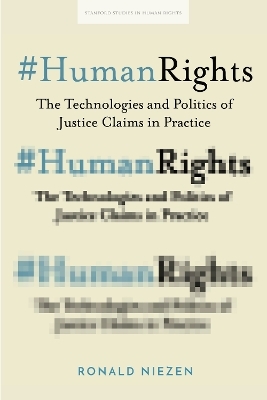
#HumanRights
The Technologies and Politics of Justice Claims in Practice
Seiten
2020
Stanford University Press (Verlag)
978-1-5036-1263-1 (ISBN)
Stanford University Press (Verlag)
978-1-5036-1263-1 (ISBN)
Social justice and human rights movements are entering a new phase. Social media, artificial intelligence, and digital forensics are reshaping advocacy and compliance. Technicians, lawmakers, and advocates, sometimes in collaboration with the private sector, have increasingly gravitated toward the possibilities and dangers inherent in the nonhuman. #HumanRights examines how new technologies interact with older models of rights claiming and communication, influencing and reshaping the modern-day pursuit of justice.
Ronald Niezen argues that the impacts of information technologies on human rights are not found through an exclusive focus on sophisticated, expert-driven forms of data management but in considering how these technologies are interacting with other, "traditional" forms of media to produce new avenues of expression, public sympathy, redress of grievances, and sources of the self. Niezen considers various ways that the pursuit of justice is happening via new technologies, including crowdsourcing, social media–facilitated mobilizations (and enclosures), WhatsApp activist networks, and the selective attention of Google's search engine algorithm. He uncovers how emerging technologies of data management and social media influence the ways that human rights claimants and their allies pursue justice, and the "new victimology" that prioritizes and represents strategic lives and types of violence over others. #HumanRights paints a striking and important panoramic picture of the contest between authoritarianism and the new tools by which people attempt to leverage human rights and bring the powerful to account.
Ronald Niezen argues that the impacts of information technologies on human rights are not found through an exclusive focus on sophisticated, expert-driven forms of data management but in considering how these technologies are interacting with other, "traditional" forms of media to produce new avenues of expression, public sympathy, redress of grievances, and sources of the self. Niezen considers various ways that the pursuit of justice is happening via new technologies, including crowdsourcing, social media–facilitated mobilizations (and enclosures), WhatsApp activist networks, and the selective attention of Google's search engine algorithm. He uncovers how emerging technologies of data management and social media influence the ways that human rights claimants and their allies pursue justice, and the "new victimology" that prioritizes and represents strategic lives and types of violence over others. #HumanRights paints a striking and important panoramic picture of the contest between authoritarianism and the new tools by which people attempt to leverage human rights and bring the powerful to account.
Ronald Niezen is the Katharine A. Pearson Chair in Civil Society and Public Policy in the Faculty of Law and in the Department of Anthropology at McGill University.
| Erscheinungsdatum | 09.06.2020 |
|---|---|
| Reihe/Serie | Stanford Studies in Human Rights |
| Zusatzinfo | 8 halftones |
| Verlagsort | Palo Alto |
| Sprache | englisch |
| Maße | 152 x 229 mm |
| Themenwelt | Recht / Steuern ► EU / Internationales Recht |
| Recht / Steuern ► Öffentliches Recht ► Verfassungsrecht | |
| Sozialwissenschaften ► Ethnologie | |
| Sozialwissenschaften ► Politik / Verwaltung | |
| Sozialwissenschaften ► Soziologie | |
| Technik ► Elektrotechnik / Energietechnik | |
| ISBN-10 | 1-5036-1263-5 / 1503612635 |
| ISBN-13 | 978-1-5036-1263-1 / 9781503612631 |
| Zustand | Neuware |
| Haben Sie eine Frage zum Produkt? |
Mehr entdecken
aus dem Bereich
aus dem Bereich
Buch | Hardcover (2024)
C.H.Beck (Verlag)
CHF 104,95


